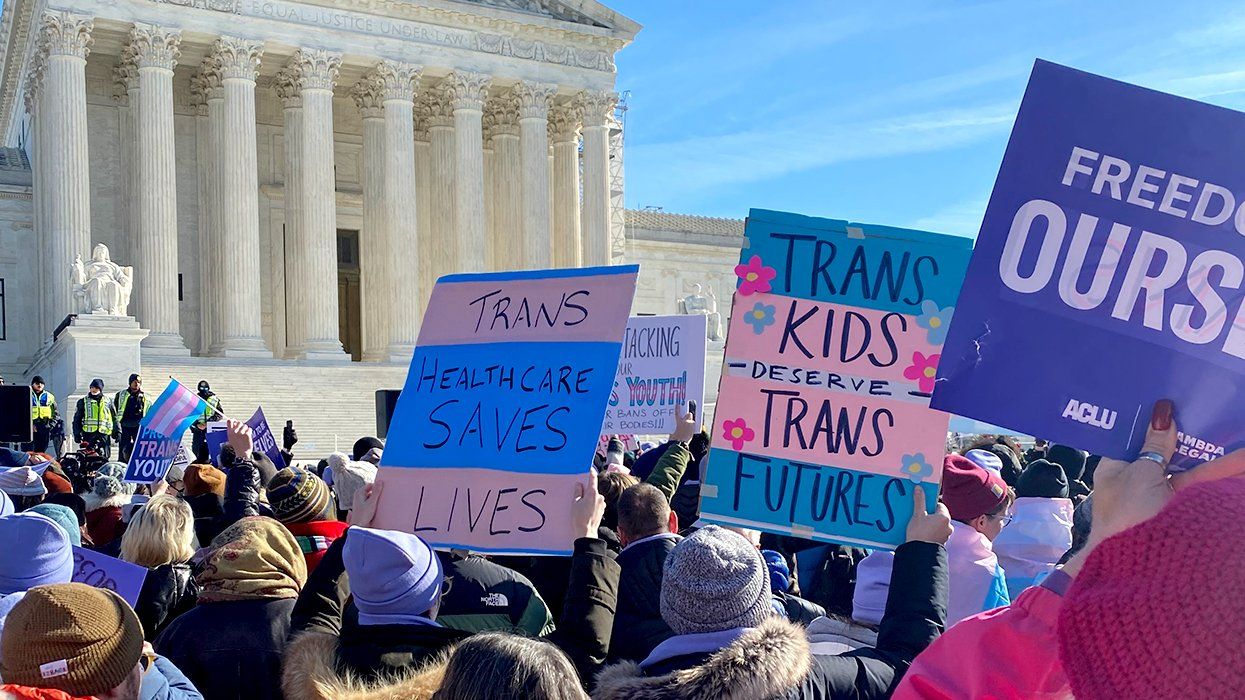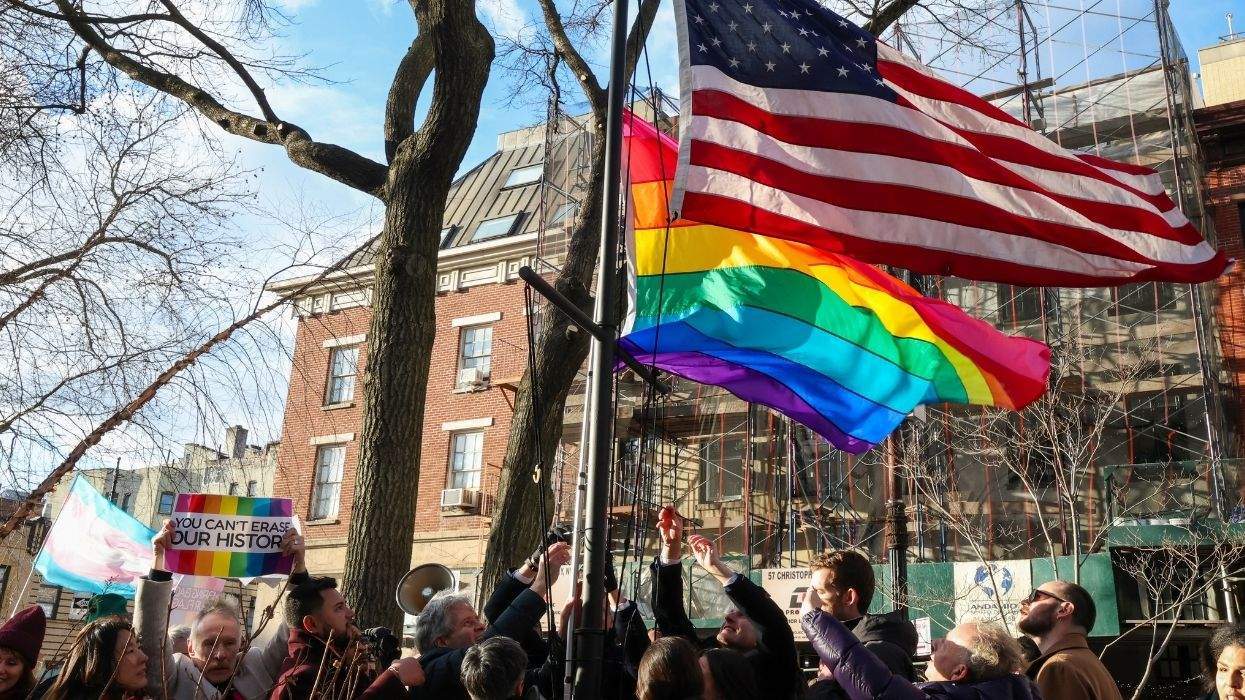In a 6–3 decision that sent shockwaves across the nation, the U.S. Supreme Court on Wednesday upheld Tennessee’s law banning gender-affirming care, including hormone therapy and puberty blockers, for transgender youth, dealing a historic setback to the rights of trans Americans and the families who support them.
Keep up with the latest in LGBTQ+ news and politics. Sign up for The Advocate's email newsletter.
The ruling in United States v. Skrmetti marks the first time the high court has ruled on the constitutionality of bans targeting gender-affirming medical care. Writing for the majority, Chief Justice John Roberts held that Tennessee’s Senate Bill 1 does not trigger heightened judicial scrutiny because it “does not draw a sex-based (or a trans status-based) line.” The Court’s reasoning, grounded in a lower standard, rational basis review, allows the law to remain in effect, and with it, the restriction of care for trans minors in Tennessee and more than two dozen other states with similar statutes.
Related: What is U.S. v. Skrmetti, the Supreme Court case that could change gender-affirming care forever?
“Today’s Supreme Court decision is a devastating blow to transgender youth and the families who love them,” said Human Rights Campaign President Kelley Robinson. “This Court chose to allow politicians to interfere in medical decisions that should be made by doctors, patients, and families — a cruel betrayal of the children who needed them to stand up for justice when it mattered most.”
The Tennessee law, passed in 2023 and blocked by a federal court before being reinstated by the Sixth Circuit, was challenged by three families and a Memphis-based physician, Dr. Susan Lacy, who was represented by the American Civil Liberties Union, the ACLU of Tennessee, and Lambda Legal. The Biden administration initially joined the suit, but under Donald Trump, the Justice Department reversed its position, backing the Tennessee ban. The reversal foreshadowed the ruling’s political overtones and underscored the precariousness of civil rights under the Court’s current majority.
Related: Supreme Court rules states can ban gender-affirming care for youth in U.S. v. Skrmetti
In her dissent, Justice Sonia Sotomayor (joined by Judges Elena Kagan and Ketanji Brown Jackson) accused the majority of abandoning its constitutional duty. “The majority subjects a law that plainly discriminates on the basis of sex to mere rational-basis review,” she wrote. “By retreating from meaningful judicial review exactly where it matters most, the Court abandons transgender children and their families to political whims. In sadness, I dissent.”
Wednesday’s ruling stunned LGBTQ+ advocates and medical experts, who warn the decision will put lives at risk and codify a two-tiered system of care.
“Today’s ruling is a devastating loss for transgender people, our families, and everyone who cares about the Constitution,” said Chase Strangio, co-director of the ACLU’s LGBTQ & HIV Project, who argued the case before the court in December. “Though this is a painful setback, it does not mean that transgender people and our allies are left with no options to defend our freedom, our health care, or our lives.”
Related: Tennessee AG: It was God's will for him to defend gender-affirming care ban at Supreme Court
Sasha Buchert, director of Lambda Legal’s Nonbinary and Transgender Rights Project, added: “This is a heartbreaking ruling, making it more difficult for transgender youth to escape the danger and trauma of being denied their ability to live and thrive. But we will continue to fight fiercely to protect them.”
HRC, which organized a protest in front of the Supreme Court, noted that 27 states now have laws on the books restricting or banning gender-affirming care for minors. Twenty-three of those bans are currently being enforced, according to HRC. Some carry criminal penalties for doctors or parents who assist youth in accessing this care.
Robinson warned of the personal cost: “Families may now have to make the heartbreaking choice to leave their state or split their families, or take on extensive financial burdens, in order to ensure that their kids can access medically necessary care.”
The Rainbow Youth Project, a national crisis response and advocacy organization for LGBTQ+ youth, reported an “unprecedented” surge in distress calls immediately after the decision. “We have already seen a surge in calls from youth, parents, and others,” said Executive Director Lance Preston.
Related: What LGBTQ+ groups are saying before Supreme Court justices hear gender-affirming care case
Medical consensus remains firmly opposed to these bans. Dr. Susan J. Kressly, president of the American Academy of Pediatrics, said the ruling “will have profound and far-reaching consequences for the health and well-being of transgender youth across this country and for the doctors who care for them.” Kressly added, “The science still supports gender-affirming care. Children will still need it.” The AAP, representing 67,000 pediatricians, reiterated its support for transgender and gender-diverse youth to access compassionate, evidence-based care without political interference.
“Gender-affirming care is medically necessary for treating gender dysphoria and is backed by decades of peer-reviewed research, clinical experience, and scientific consensus. Too often mischaracterized as exclusively involving surgery and hormones, this care is provided thoughtfully and with the involvement of multidisciplinary teams of physicians, mental health professionals, families, and most importantly, young people themselves,” Kressly wrote. “Denying patients access to this care not only undermines their health and safety, it robs them of basic human dignity.
“We are outraged,” said Kimberly Inez McGuire, executive director of URGE. “This decision upholds a dangerous and deeply unjust law that strips families of their rights, criminalizes love and support, and puts the lives of young people at risk.”
Democratic lawmakers were also outraged.
Rep. Becca Balint of Vermont, the first out queer person elected to Congress from her state, said, “Today’s ruling allowing Tennessee politicians to interfere in private health care decisions is not only draconian, it’s dangerous and hateful.”
Related: US v Skrmetti is a public health disaster
Oregon Sen. Jeff Merkley, a lead sponsor of the Equality Act, called the Court’s decision “the playbook for extremist politicians to continue their crusade against trans people.” He warned that the decision opens “the floodgates” for similar efforts to ban not just gender-affirming care but abortion access and other forms of medically necessary treatment.
Faith groups also condemned the ruling. “In this case, the Court has allowed Christian nationalists to use their narrow religious worldview as an excuse to suppress the health care rights of trans kids and families,” said Rev. Paul Raushenbush, CEO of Interfaith Alliance. “God loves trans youth, and so do so many religious communities and people of diverse faith and belief across our country.”
GLAAD President Sarah Kate Ellis called the ruling “a chilling step toward unchecked government overreach." She added, “Every family deserves the freedom to make the medical decisions that help their children live, thrive, and be well.”
Despite the ruling, legal advocates emphasized that it does not overturn existing precedents affirming transgender protections in employment, education, and other areas. Still, the impact of Skrmetti is already reshaping the legal and cultural landscape and signaling, in no uncertain terms, that the fight over bodily autonomy, parental rights, and medical freedom is far from over.
“This is a sad day, and the implications will reverberate for years and across the country,” Buchert said. “But it does not shake our resolve to continue fighting.”
















Charlie Kirk DID say stoning gay people was the 'perfect law' — and these other heinous quotes
These are some of his worst comments about LGBTQ+ people made by Charlie Kirk.